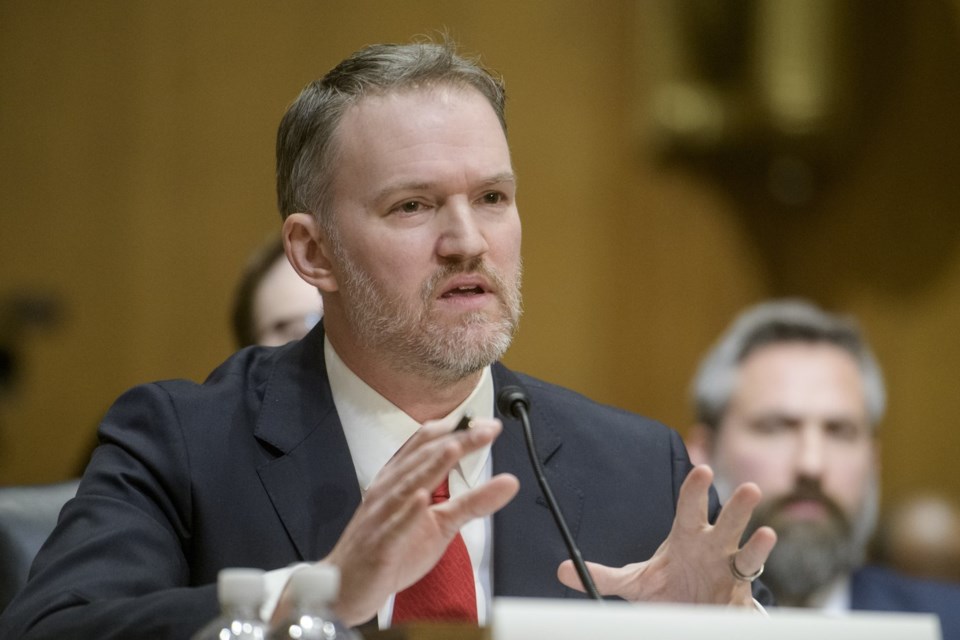WASHINGTON — The man likely to be named the United States' chief trade negotiator argued Thursday that President Donald Trump's tariff threat against Canada is about fentanyl trafficking as he faced questions about the levies from Republicans and Democrats.
Jamieson Greer, Trump's choice for U.S. trade representative, told his Senate confirmation hearing that America doesn't want to see another fentanyl death and slapping Canada with devastating duties is within the president's power to respond to America's drug crisis.
Congress has authority over taxes and foreign commerce but Trump pushed ahead with the levies using the International Economic Emergency Powers Act (IEEPA), a national security statute that gives the U.S. president authority to control economic transactions after declaring an emergency.
Peter Welch, a Democratic senator for Vermont, asked Greer directly if he thought Canada's border required the use of these tariffs.
“Yes," Greer responded.
"I don't," Welch responded.
U.S. border patrol statistics show that less than one per cent of fentanyl seized is found at the northern border.
Monday's temporary pause on Trump's executive order to impose 25 per cent across-the-board tariffs on all Mexican and Canadian imports, with a lower 10 per cent tariff on Canadian energy, has brought little relief. Trump has linked the duties to what he calls the illegal flow of people and fentanyl across the borders.
Trump is delaying the levies until at least March 4 in response to border security commitments from both countries. He has said it will allow time to reach a "final economic deal."
Greer said Thursday that it looks like Canada and Mexico have come to the table.
Experts have warned a trade war could harm the economies of both Canada and the U.S. and drive up inflation.
Canadian ministers are in Washington this week to meet with lawmakers, industry and Trump's team to gain insight about what the president wants to make the tariff threat drop for good.
Energy and Natural Resources Minister Jonathan Wilkinson said even among senior Republicans the president's intentions remain unclear.
"I would say it’s certainly not clear to a lot of folks at the present time exactly what the president is aiming for," Wilkinson said Thursday.
Both Canada and the U.S. are concerned, Wilkinson said. He continues to share Ottawa's response to the president's concerns.
Trump has repeatedly complained about the trade balance with Canada. Wilkinson said Canadian officials are clarifying to American lawmakers that, excluding energy, the United States has a trade surplus with Canada.
Greer's Senate hearing heard from worried lawmakers who have been contacted by industry and business groups distressed about how looming threats could impact their local economies.
Nevada Democrat Sen. Cortez Masto said the tourism industry will be devastated if Canadians stop travelling to Las Vegas. A Canadian company had already cancelled an order with a small business owner in Nevada, citing market concern, Masto said.
Greer played a key role in the first Trump administration by imposing tariffs on China and negotiating the Canada-U.S.-Mexico Agreement.
He was the chief of staff to former U.S. trade representative Robert Lighthizer as the trilateral agreement was being crafted to replace the North American Free Trade Agreement, which was terminated the last time Trump became president.
If confirmed, Greer will oversee the trade pact’s review in 2026. Experts have suggested that Trump's recent tariff threat is an attempt to rattle Canada and Mexico ahead of negotiations.
Greer said Thursday that there will be a "second look" at the trilateral pact. He pointed to issues around rules of origin and types of market access, including Canada's dairy sector.
This report by The Canadian Press was first published Feb. 6, 2025.
Kelly Geraldine Malone, The Canadian Press

